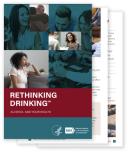There is a wide range of short- and long-term consequences associated with alcohol misuse. For some individuals, any amount of drinking could be potentially harmful.
Fatalities and injuries. Alcohol-related deaths are increasing in the United States. Alcohol is a factor in about 25% of suicides, about 40% of fatal burn injuries, about 50% of fatal drownings and of homicides, and about 65% of fatal falls. Around 31% of all motor vehicle traffic fatalities involve alcohol. The rate of alcohol-related emergency department visits increased by nearly 50% from 2006 to 2014, and about one-third of injuries treated at trauma centers are alcohol related. In addition, a significant number of sexual assaults involve alcohol use.
Alcohol-related blackouts. Blackouts are gaps in a person’s memory for events that occurred while they were intoxicated. These gaps happen when a person drinks enough alcohol to temporarily block the transfer of memories from short- to long-term storage—known as memory consolidation—in a brain area called the hippocampus.
Health problems. Drinking is associated with a number of health problems and can make certain chronic health problems worse. Half of liver disease deaths in the United States are caused by alcohol, and alcohol-associated liver disease is increasing, particularly among women and young people. Research has shown an important association between alcohol consumption and breast cancer—even one drink per day can increase a woman’s risk for breast cancer by 5% to 15% compared to women who do not drink. Individuals who carry certain gene variants associated with alcohol-related flushing (e.g., the ALDH2*2 variant) are at an elevated risk of unpleasant reactions and even esophageal cancer from alcohol consumption. Research has also shown that alcohol misuse increases the risk of liver disease, cardiovascular diseases, depression, and stomach bleeding, as well as cancers of the oral cavity, esophagus, larynx, pharynx, liver, colon, and rectum. Many people who have had bariatric surgery feel the effects of alcohol more intensely and quickly, even after drinking lower amounts of alcohol, than prior to surgery. These effects can lead to greater impairment and other consequences of drinking, including misuse and a risk for increased alcohol problems, which can manifest several years after surgery. People who misuse alcohol may also have difficulty managing conditions such as diabetes, high blood pressure, pain, and sleep disorders. And people who misuse alcohol are more likely to engage in unsafe sexual behavior, putting themselves and others at risk for sexually transmitted infections and unintentional pregnancies.
Why is Being Able to “Hold your Liquor” a Concern?
For some people who drink, it takes quite a few drinks to “get a buzz” or feel relaxed, and they may be less likely to show signs of intoxication compared to others. This is sometimes called being able to “hold your liquor” or “drink someone under the table.” Often these individuals are unaware that their body’s lower response to the intoxicating effects of alcohol isn’t protection from alcohol problems but instead is a reason for caution.
These individuals tend to drink more, socialize with people who drink a lot, and develop a tolerance to alcohol (i.e., it takes more and more alcohol to feel or act intoxicated). As a result, they have an increased risk for developing AUD. Someone who misuses alcohol, especially over the long term, can experience permanent liver, heart, or brain damage. And all people who drink, regardless of the amount, need to be aware that critical decision-making abilities and driving-related skills are already diminished long before a person shows physical signs of intoxication.
Birth defects. Prenatal alcohol exposure can result in brain damage and other serious problems in babies. The effects are known as fetal alcohol spectrum disorders, or FASD, and can result in lifelong physical, cognitive, and behavioral problems. Because there is no known safe level of alcohol for a developing baby, women who are pregnant or might be pregnant should not drink.
Alcohol use disorder (AUD). Please see the box below for a definition of AUD. Some signs of AUD are continuing to drink even though it is causing trouble with your family or at work, drinking more than you intended, having to drink more than before to get a desired effect, being unable to stop drinking after repeated attempts, or continuing to drink despite negative consequences. Signs of AUD may also include drinking to alleviate negative emotions, such as feeling "low," anxious, uneasy, unhappy, unwell, dissatisfied with life, or other negative emotions that were caused or worsened by alcohol misuse. Learn more about the symptoms of AUD. Having any of these symptoms may be a cause for concern. The more symptoms one has, the more urgent the need for change.
Beyond these physical and mental health risks, frequent alcohol misuse also is linked with personal problems, such as losing one’s driver’s license or having relationship troubles.
What is AUD?
AUD is characterized by an impaired ability to stop or control alcohol use despite adverse social, occupational, or health consequences.
It is a spectrum disorder and can be mild, moderate, or severe and encompasses the conditions that some people refer to as “alcohol abuse,” “alcohol dependence,” or the colloquial term “alcoholism.” AUD can cause lasting changes in the brain that make people vulnerable to return to use. The good news is that no matter how severe the problem may seem, most people with AUD can benefit from treatment with behavioral therapies, medications, or both.



